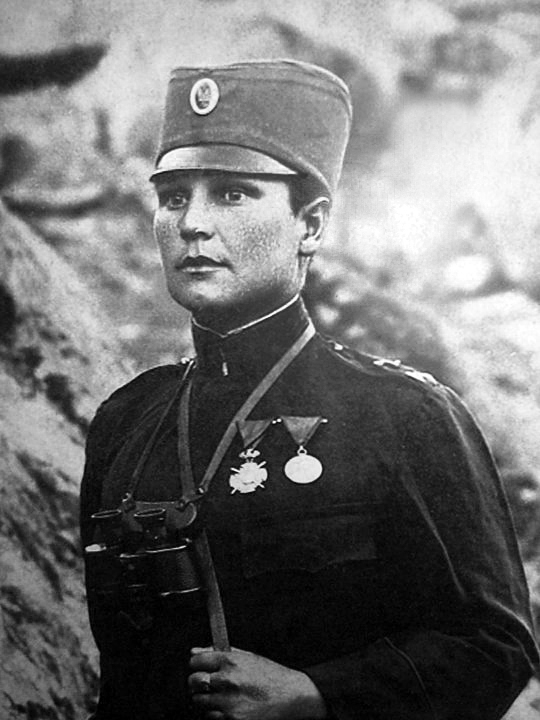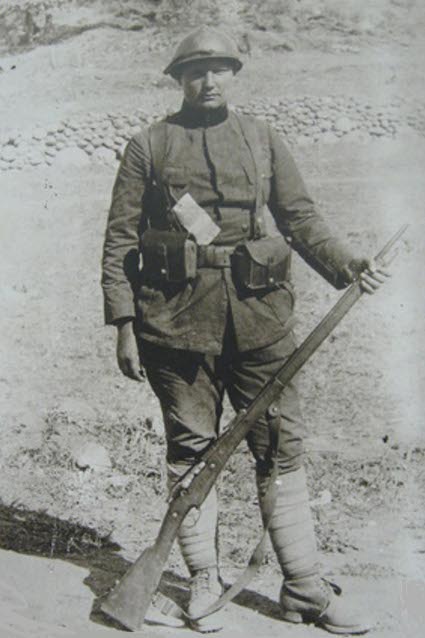When her brother was called to mobilize for the First Balkan War, she went as well. She cut her hair, wore men’s clothes, and became a Serbian war heroine.
Milunka Savić was born on June 28, 1888, in Koprivnica, Serbia.
Milunka was twenty-four years old when she joined the Serbian army in 1912. Women were only allowed to serve performing medical duties, so she took her brother’s name and became a soldier.
Not long after joining the army, Milunka saw combat. At the Battle of Bregalnica, she was promoted to corporal and received her first medal for bravery. Although she had been wounded, she returned to fighting on the front lines.
After her tenth deployment, and partway through the Second Balkan War, Milunka was wounded by a Bulgarian grenade and taken to the field surgeons. Her injuries were such that her gender was revealed.
Milunka’s commanding officer informed her no one wanted to punish her. She was a “valuable and highly competent soldier,” but she was also a woman and women were not allowed to serve in combat.
She was offered a transfer to the Nursing division. Savic stood at attention and insisted she only wanted to fight for her country as a combatant. The officer said he’d think it over and give her his answer the next day. Still standing at attention, Savic responded, “I will wait.”
It is said he only made her stand an hour before agreeing to send her back to the infantry.
During World War I, she stood out as a bomber at the Battle of Kolubara.
According to Akademedia Srbija, in 1914, Milunka was awarded her first Karađorđe Star with Swords, the highest award offered by the kingdom of Serbia. She received the medal after the Battle of Kolubara for multiple accounts of heroism. Milunka crossed “no man’s land” alone, chucked grenades at the enemy, cleared the trenches and captured twenty soldiers.
She received her second Karađorđe Star with Swords after the Battle of the Crna Bend in 1916, when she crossed “no man’s land” again, cleared the trenches, and captured twenty-three Bulgarian soldiers.
Milunka was injured seven more times. When the army retreated along the coast, Serbia became a brigade unit in the French army. She was injured again in Tunisia, but continued to fight on the front lines, eventually becoming a non-commissioned officer.
During a stay by the Serbian army in Greece, Milunka Savic, at a ceremony in Thessaloniki, provoked French officers to drop a ten-step bomb, took a bottle of cognac (weighing two hand grenades) and threw it at a distance of 40 meters. For this, she received 18 bottles of the most expensive French cognac from 1880 from French General Mauritius Sarai for her fellow soldiers in the company.
Milunka earned more honors for her heroism, receiving the silver and gold medals for bravery during the Balkan Wars. Foreign governments also recognized her distinguished service to her country.
She was awarded the French Légion d’Honneur (Legion of Honour) twice, as well as the Russian Cross of St. George, the British medal of the Most Distinguished Order of St Michael, and the Serbian Miloš Obilić medal. She was the sole female recipient of the French Croix de Guerre 1914–1918 with the gold palm attribute for service in World War I.
After World War I ended, Milunka retired and worked as a postal worker. France offered to have her move there and receive a French military pension, but she declined. Milunka thought she would spend the rest of her life quietly in Belgrade.
She married Veljko Gligorijević in 1923, but divorced him right after their daughter, Milena, was born. She adopted three other girls who were war orphans.
Milunka worked several other menial jobs before taking a position as a cleaning lady at the State Mortgage Bank. Eight years later, she received a promotion and began cleaning the offices of the general manager.
During the Axis occupation of Serbia, she was placed in the Banjica concentration camp for ten months because she refused to attend a banquet in which Nazis and Nazi collaborators, including Serbian Prime Minister Milan Nedić, were in attendance.
As the story goes, the Germans were unaware she was imprisoned, but, when a high-ranking German officer, or commander of the Banjica camp depending on the version of the story, saw her name on the list of prisoners, he verified she was there. The German officer ordered the guards to bring Milunka to him.
When she arrived at his office, he saluted her as a military officer and shook her hand. The German officer had been captured by Milunka during World War I and was, supposedly, in awe of the heroine. He had her released.
When the communists came to power, Milunka fell into neglect and oblivion. She was given a state pension in 1945 when she retired. By the late 1950s, her home where she lived with her other three adopted children was crumbling.
When Milunka attended the jubilee celebrations of World War I wearing her medals, she told her stories of courage and bravery. Other retired military personnel were impressed by her stories and the fact that she had more medals than anyone else.
In 1972, after complaints from the citizens of Belgrade and a newspaper article, the Belgrade City Assembly provided her with a small apartment where she spent the remainder of her life. Milunka died in Belgrade on Oct. 5, 1973, age 85. She has a street named after her in Belgrade and other cities in Serbia and Republika Srpska.
When the dust settles only graves and legends of glory remain. Milunka will always be the best legend of them all.



Jina Red Nest
Wonderful great story! I cant keep up the days go so fast…but i liked this
Irene
I’m glad you’ve been enjoying them, Jina.